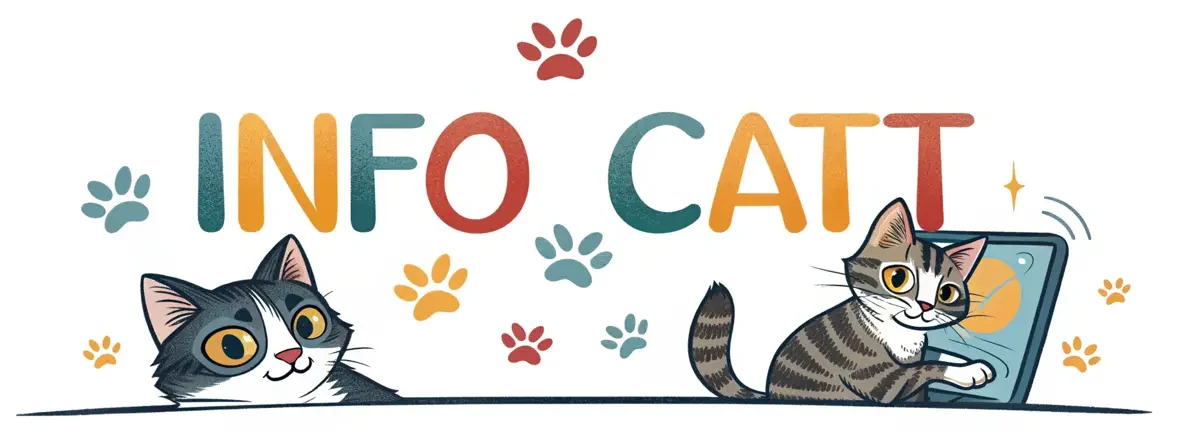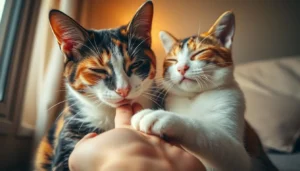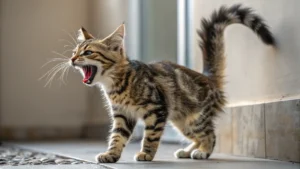You’re sitting peacefully, stroking your beloved feline friend, when suddenly – ouch! A sharp bite pierces the moment of calm. If you’ve ever wondered, “Why is my cat biting me?” you’re not alone. Cat owners across the United States frequently grapple with this puzzling and sometimes painful behavior.
Understanding the reasons cats bite their owners isn’t just about preventing painful encounters. It’s about deeper communication and strengthening the bond with your furry companion. Cats communicate through body language and actions, and biting is one of their most misunderstood forms of expression.
Every bite tells a story. Whether it’s a gentle love nip or a more aggressive chomp, your cat is trying to tell you something important. From playful interactions to signs of stress, these biting behaviors are complex messages waiting to be decoded.
Understanding Cat Biting Behavior: Normal vs. Aggressive
Cat behavior can be tricky, like when they bite. Knowing if your cat is just playing or being mean is important. It’s key to understand their language for a good bond.
It’s vital to see the difference between playful and mean bites. Cats send signals through their body language. This helps you know what they’re feeling and what they want.
👉 Distinguishing Between Playful Nips and Aggressive Bites
Wondering if your cat is being playful or aggressive? Here are some signs:
- Playful bites are soft and come with relaxed body language
- Aggressive bites are hard, with ears back and big pupils
- Playful cats move loosely and bouncily
- Aggressive cats are stiff and tense
👉 Reading Your Cat’s Body Language
Cats talk with their whole body. Tail position, ear direction, and posture tell you how they’re feeling. A happy cat’s tail is up a bit, while a twitching tail means they’re upset.
👉 The Role of Early Socialization
Getting socialized early is crucial for cats. Kittens learn how to bite right from their mom and siblings. This helps them communicate better as adults.
Understanding your cat’s unique communication style is key to preventing unwanted biting behaviors.
Why Is My Cat Biting Me? Common Triggers Explained
It can be confusing to figure out why cats bite. Cats have their own way of talking, and what looks like a mean bite might just be a way to say something. It could be a form of communication or a way to express themselves.
Looking into why cats bite when petted, we find a few main reasons:
- Overstimulation: Cats might get too much when petted, so they gently bite to ask for a break
- Playful instincts that make them act like they’re hunting
- They want attention or are trying to tell you something emotionally
- They might have had bad experiences or not been socialized enough
Why do cats bite gently? It’s because of their natural way of talking. They use soft bites to show love, mark their territory, or set boundaries. It’s how they interact with the world and with us.
“Cats speak a language of touch and subtle signals that humans must learn to understand.” – Feline Behavior Expert
Different situations can make cats bite. During play, they might nibble gently to get you involved. But if they’re feeling stressed or too excited, their bites can get stronger. It’s important to know what’s going on to understand what they’re trying to say.
Watch how your cat acts and what’s around them. Stress, not being social enough, or sudden changes can make them bite. Knowing what makes them bite can help you and your cat get along better.
While biting can seem aggressive, other behaviors like licking may confuse you too. Find out why your cat licks you .
Love Bites: When Your Cat Shows Affection Through Gentle Nibbles
Cats show love in their own special way. Those gentle nibbles they give you are not just random. They are a sign of affection.
Cats talk to us through touch, and love bites are a big part of that. These soft bites show they feel close and comfortable with us.
The Science Behind Love Bites
Cats bite when they feel strong emotions. This behavior comes from their psychology and biology. Here are a few reasons:
- Mimicking kitten play with their mother
- Showing trust and emotional attachment
- Releasing built-up excitement
How to Respond to Affectionate Biting
Not all cat bites are mean. If your cat bites you gently, try these:
- Stay calm and avoid sudden movements
- Gently redirect their attention
- Provide alternative play options
When Love Bites Become Too Much
Love bites are usually okay, but they can be a problem if they get too intense. Watch your cat’s body language to see when playful bites might turn mean.
Remember, each cat is unique, and understanding their individual communication style is key to a strong bond.
Overstimulation and Stress: Hidden Causes of Cat Biting
Cats are very sensitive and can get overwhelmed easily. It’s important to know when they’re overstimulated to avoid biting. Stress can make them act defensively, which can surprise you.
To spot when a cat is stressed, watch their body language and behavior. Look for signs like:
- Tail twitching or thrashing
- Ears flattened against the head
- Dilated pupils
- Sudden skin rippling or twitching
- Excessive grooming or hiding
The environment around your cat affects their stress levels a lot. Things like loud noises, changes in routine, new pets, or visitors can stress them out. Cats like routine and calm.
To lower your cat’s stress, give them a safe place to go. This could be a quiet room, a cozy cat tree, or a hiding spot. Try to keep sounds down and stick to a daily routine to make them feel safe.
Remember, every cat is unique. What stresses one might not bother another.
By knowing what stresses your cat and creating a supportive space, you can lower the chance of them biting due to stress. This will also make your bond with them stronger.
Warning Signs Your Cat Is About to Bite
Learning to spot cat biting without warning means watching your cat closely. Cats usually give hints before they get aggressive. They don’t just attack without warning.
It’s important to know how to stop your cat from biting. By noticing their signals, you can avoid fights.
Physical Indicators to Watch For
Your cat’s body language is key before they bite. Look out for these signs:
- Tail swishing rapidly back and forth
- Ears flattened against the head
- Dilated pupils
- Fur standing on end
- Crouched or tense body posture
Behavioral Changes That Signal Discomfort
Cats show stress and anger in their behavior. Watch for these signs:
- Growling or low-pitched vocalizations
- Sudden cessation of purring
- Repeated tail thumping
- Repeated licking or excessive grooming
Environmental Factors That Increase Bite Risk
Some things in the environment can make your cat more likely to bite. Overstimulation, loud noises, new people, or sudden movements can upset them.
Knowing these warning signs helps you and your cat get along better. It also stops unexpected bites.
Effective Methods to Stop Your Cat from Biting
Stopping your cat from biting takes patience and consistent training. First, understand why your cat bites. Cats bite for many reasons, so each case needs a special solution.
Here are some effective strategies to manage cat biting:
- Use positive reinforcement techniques to reward good behavior
- Redirect aggressive play with appropriate toys
- Recognize and avoid overstimulation triggers
- Create a calm, predictable environment
When your cat starts to bite, do these things right away:
- Stop moving and remain still to reduce prey-like response
- Make a sharp, high-pitched “ouch” sound to signal discomfort
- Gently remove your hand without pulling or showing aggression
- Offer a toy as an alternative to biting
Professional cat behaviorists recommend consistency in your approach. Never punish your cat physically, as this can make things worse. Instead, focus on understanding the reasons behind your cat’s biting and fix those issues.
Patience and gentle correction are key to modifying your cat’s biting behavior.
Conclusion
Understanding why cats bite their owners takes patience and careful watching. Cat behavior shows that biting is usually not mean-spirited. Your cat talks to you in many ways, and what looks like anger might be a complex message.
Every bite tells a story about your cat’s feelings, health, and what’s going on around them. It could be about play, too much excitement, stress, or even love. Learning to understand these signs can change your relationship for the better.
By using the tips from this article, you can cut down on unwanted biting. Remember, training, socializing, and a calm space are crucial. With effort, you’ll grow closer to your cat.
Fixing cat biting problems is about building trust and respect. By getting to know your cat’s personality and how they communicate, you’ll have a better, more loving bond.
FAQ
Why do cats bite their owners?
Cats bite for many reasons. They might be playing, feeling stressed, or trying to show love. It could also be a learned behavior from when they were kittens. Paying attention to your cat’s body language can help you understand why they bite.
Do you love bites from normal cats?
Yes, love bites are common in cats. They show affection, excitement, or over-arousal. But, it’s important to teach them that biting isn’t always okay, even if it’s gentle.
How can I tell if my cat is about to bite?
Watch for signs like a swishing tail, flattened ears, or dilated pupils. If your cat’s body stiffens, ears go back, or they growl, they might bite soon.
Is my cat being aggressive or just playing?
Playful bites are soft and relaxed. Aggressive bites are hard and come with defensive postures. Playful bites are about fun, while aggressive ones are about fear or threats.
Why do kittens bite so much?
Kittens bite to explore and learn social boundaries. It’s a natural part of their development. Teaching them proper behavior can help reduce biting as they grow.
How can I stop my cat from biting?
To stop biting, redirect their attention with toys and avoid rough play. Respect their space and use positive reinforcement. Training and recognizing overstimulation signs are key. If biting continues, seek professional help.
Can stress cause my cat to bite?
Yes, stress can make cats bite. Changes, new pets, or loud noises can stress them out. A calm environment can help reduce stress-related biting.
What should I do immediately after my cat bites me?
Stay calm and avoid punishing your cat. Gently pull your hand back and say “ouch” to show pain. Clean the wound with soap and water, and apply antiseptic. If it’s deep or infected, see a doctor. Then, figure out what caused the bite to avoid it in the future.



